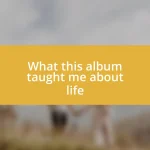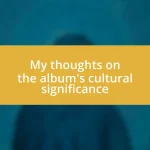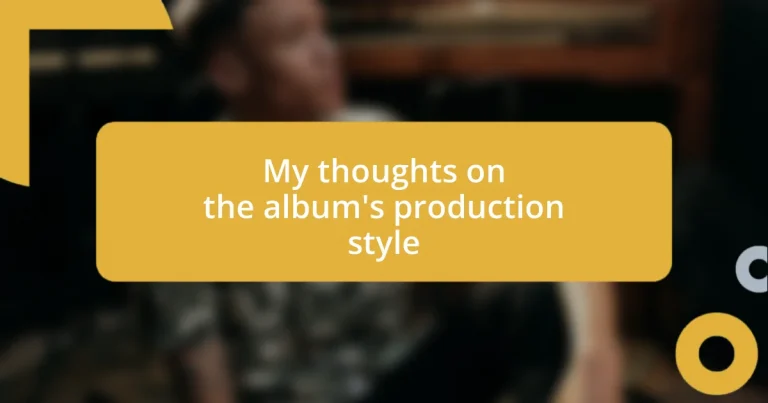Key takeaways:
- The production evolution in music, influenced by technology, has led to a more polished sound, prompting nostalgia for the raw energy of earlier works.
- Modern collaboration methods, while enhancing creativity, may lack the personal connection and spontaneity found in traditional in-person jam sessions.
- Listeners have mixed responses to contemporary production choices, balancing innovation with authenticity, and reflecting on how different styles affect emotional engagement with music.
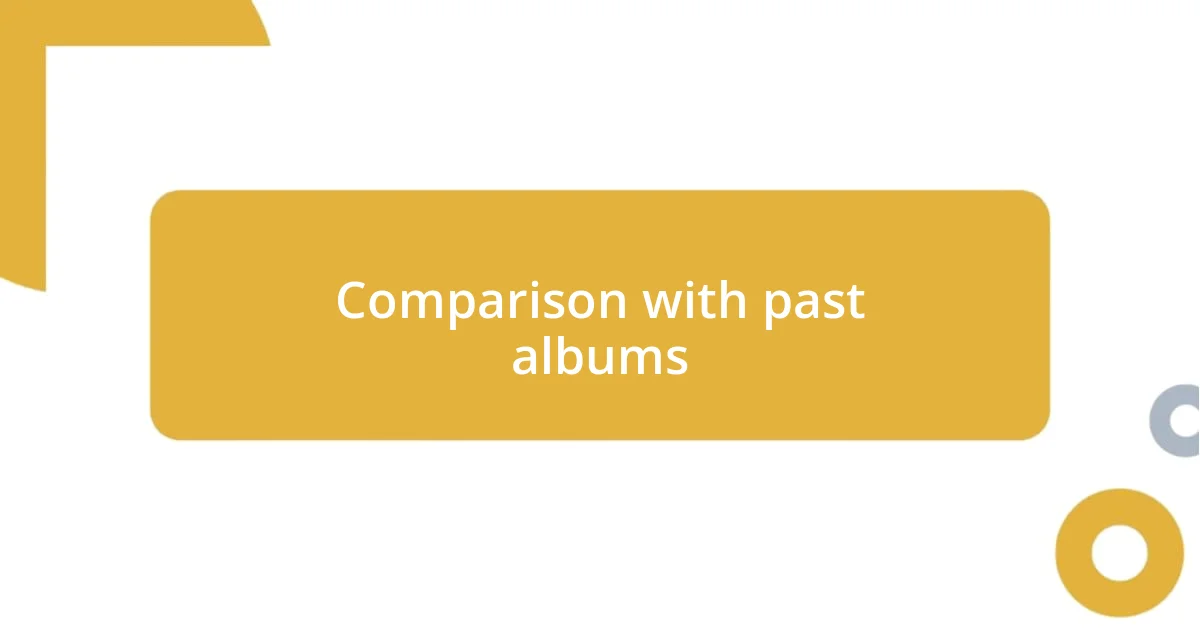
Comparison with past albums
When I listen to this latest album, I can’t help but think back to the raw energy of their earlier work. There’s something nostalgic about the way those earlier tracks were produced—each note felt like it was bursting with emotion. It makes me wonder, do you miss that unfiltered sound too?
In contrast, the production style of this album seems more polished, almost giving it a commercial feel. I remember how the gritty textures of their debut album grabbed my attention; it was like peeling back layers of a story. Now, I find myself pondering whether this shift in production is a reflection of their growth or a departure from their roots.
It’s intriguing to me how their storytelling has transformed with the production choices. The layered sounds in this new album can sometimes feel overwhelming, yet I can appreciate the ambition behind it. My heart races thinking about how each album has shaped my connection to their music, but I can’t shake the feeling that something has been lost along the way. Have you felt that tension between nostalgia and innovation in your own listening experience?
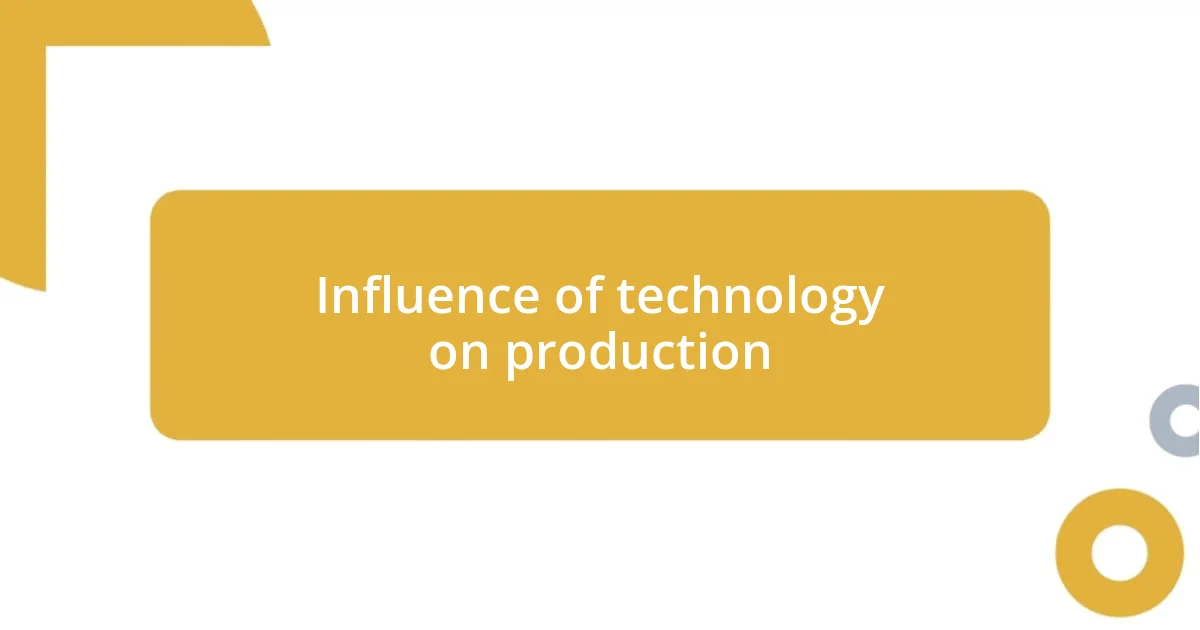
Influence of technology on production
The evolution of technology in music production has undeniably shaped the soundscapes we enjoy today. I recall the first time I used a digital audio workstation—suddenly, endless possibilities flickered before my eyes. It felt like stepping into a new world where every track could be meticulously crafted and polished, yet I often wonder if it compromises some of the authenticity that I grew to cherish in earlier recordings.
Moreover, advancements such as auto-tuning and virtual instruments have created a divergence between artistry and precision. I sometimes think about how the use of auto-tune can enhance vocals, but there’s a part of me that misses the human imperfections that lent a raw beauty to earlier music. When I hear some tracks today, I can’t help but feel there’s a little less soul, perhaps because performers aren’t as exposed to the intricacies of live recording anymore. Does the ease of modern production tools enhance creativity, or does it take away from the unique bond between the artist’s raw talent and the listener’s experience?
Finally, the integration of technology has transformed collaboration in ways I never expected. I remember jamming with friends in a cramped garage, where our ideas flowed in real-time, filled with spontaneity. Nowadays, musicians can collaborate from across the globe, sending files back and forth at lightning speed. While this flexibility fosters creativity, it makes me wonder if the true magic of creating music together, side by side, has been somewhat diluted. Isn’t that personal connection essential to the magic of music-making?
| Production Aspect | Traditional Techniques | Modern Techniques |
|---|---|---|
| Recording Medium | Analog tape | Digital audio workstations (DAWs) |
| Vocal Editing | Live recording | Auto-tune & pitch correction |
| Collaboration | In-person jamming | Virtual collaboration |
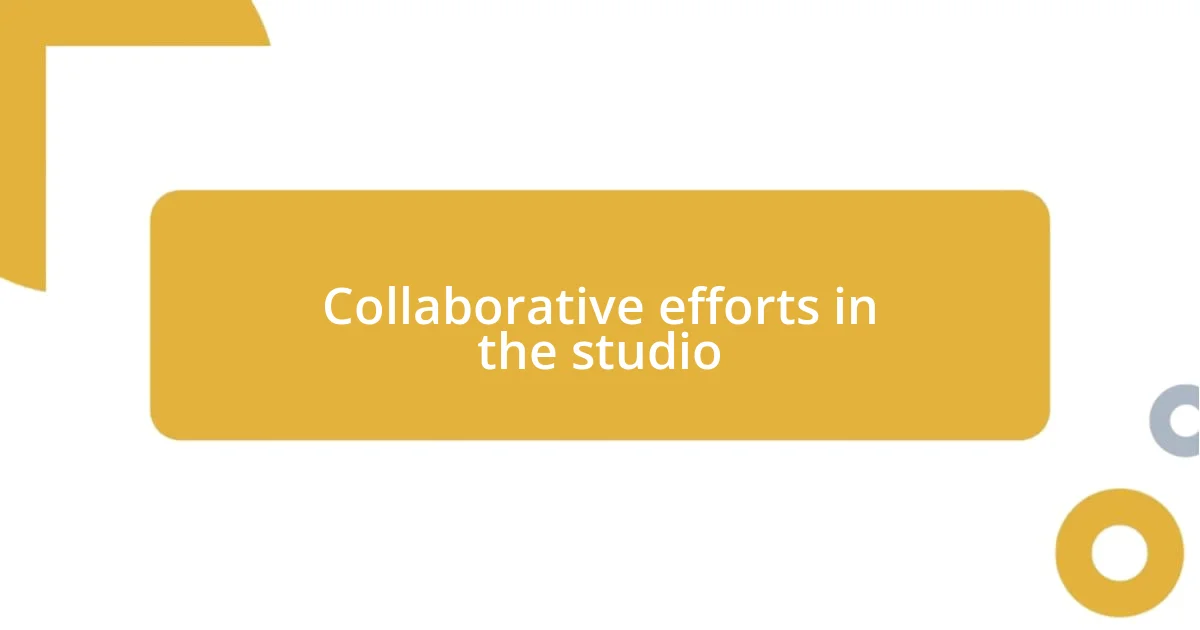
Collaborative efforts in the studio
One of the most stunning aspects of music production today is the collaborative effort that happens in the studio. I recall a moment when I was part of a songwriting retreat with my band, deeply locked in our creative bubble. We were throwing musical ideas around in a cramped room, each riff and lyric contributing to the collective energy. That kind of shared experience breeds spontaneity, and it’s incredible to think about how technology both enhances and challenges that traditional synergy.
Here are some highlights of collaborative efforts in modern music production:
- Global Collaboration: Artists can now create music with people they’ve never even met, which opens the door to diverse influences and styles.
- Remote Recording: Musicians can send tracks across the world, allowing for greater flexibility but sometimes losing that immediate, instinctive vibe of in-person sessions.
- Real-Time Feedback: Thanks to technology, artists can receive instant feedback, which can accelerate the creative process but also risks losing the nuanced back-and-forth that happens face-to-face.
On the flip side, when I think about past recording sessions, I feel nostalgia wash over me. There’s something about sitting in a room full of musicians, riffing off each other’s energy, that creates an unrepeatable magic. I often wonder if artists today feel that same heartbeat through the screen. What do you think? Does the thrill of collaboration resonate with you in a different way now?
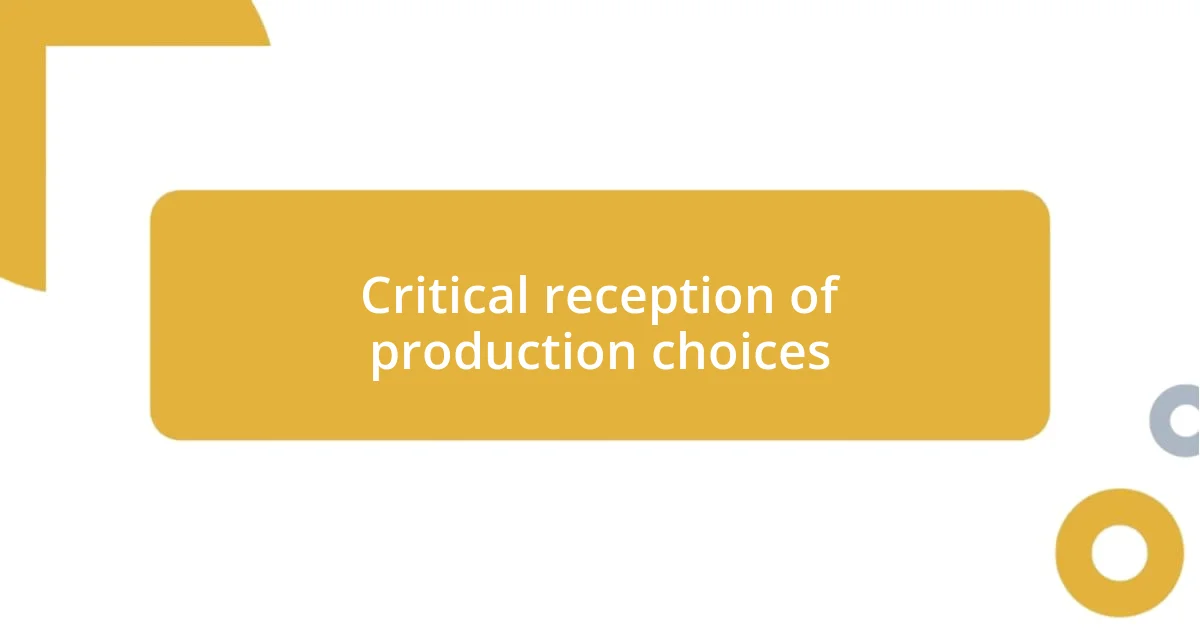
Critical reception of production choices
The reception of an album’s production choices often hinges on how well they align with listeners’ expectations and tastes. I’ve found that when an artist ventures into modern production techniques, the reactions can be polarizing. Take, for instance, an artist I admire who embraced heavily processed sounds in their latest album. While many celebrated the vibrant, polished vibes, I couldn’t shake the feeling that the essence of their earlier work got somewhat lost in translation. Has anyone else felt that strange disconnect between what we loved and what we now hear?
People frequently dissect the layering and mixing choices made during production. During a recent conversation with a fellow music enthusiast, we explored how complex arrangements can either enthrall or overwhelm. I shared my excitement about an album bursting with lush harmonies, but my friend expressed feeling suffocated by the production’s density. This led us to question: how much is too much when it comes to sonic textures? Finding that perfect balance is where the magic (and the critique) happens.
Critics often have mixed feelings about the reliance on technology in production. Personally, I remember feeling exhilarated when an artist I respected took a leap with experimental soundscapes. Yet, when conversations shifted online, some fans voiced concerns about authenticity. I pondered on this. Is it fair to judge an artist’s choice to innovate? I think it’s essential to understand that every production decision is a reflection of the artist’s journey, which often resonates deeply, even if it invites critique. Isn’t that what makes music so compelling?
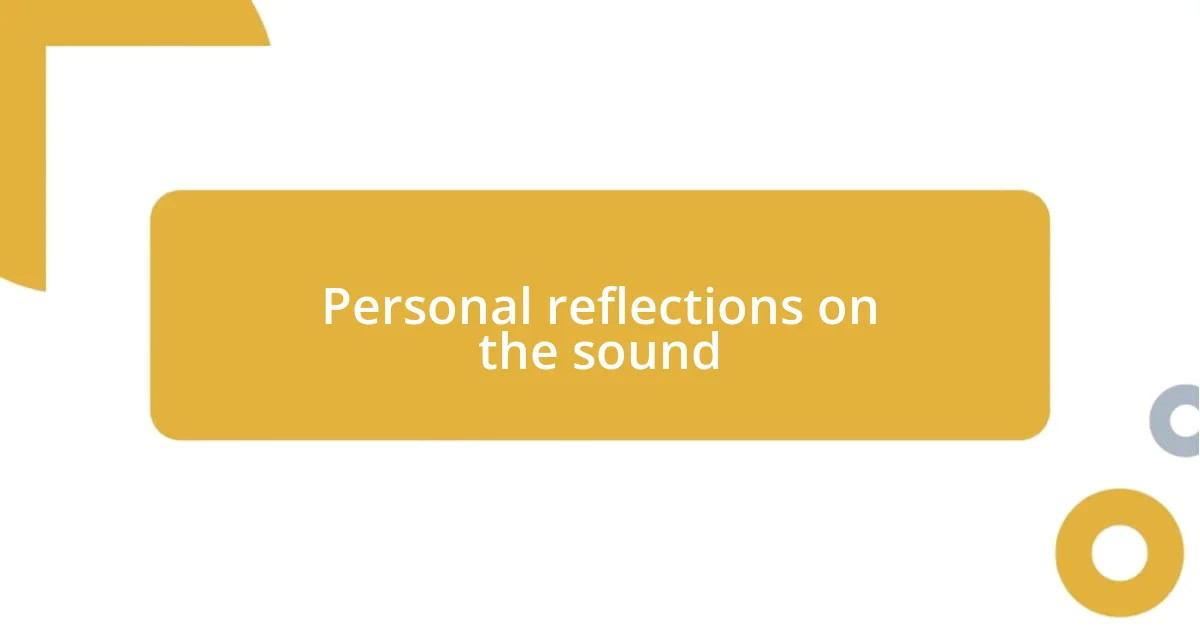
Personal reflections on the sound
The sound of an album can evoke a cascade of emotions, often transporting me to a place that feels intimate yet deeply universal. I remember listening to a friend’s newly released track, where he infused ambient sounds with acoustic guitars. It struck me in a way few things do; the ethereal layers wrapped around me like a warm embrace. Have you ever felt that way when a song wraps around your heart? It’s staggering how a simple production choice can have such a profound impact on our emotions.
I often think about how different production styles shape our listening experiences. For instance, there was an old record I used to spin on repeat, filled with raw, unedited vocals and clean instrumentation. The grittiness of the sound made it feel true and alive, almost like eavesdropping on a private moment. However, there was also one recent album that leaned heavily on synthesized beats, and while it was fun and catchy, it left me with a sense of detachment. Isn’t it fascinating how certain sounds can draw us in, while others push us away?
Reflecting on the sound of an album often leads me to question my own taste, too. I recently discovered an experimental piece that utterly caught me off guard—it was jarring, and yet incredibly captivating. It reminded me that sometimes stepping outside of our comfort zones can yield extraordinary musical experiences. Have you ever ventured into genres or styles you initially dismissed, only to find a whole new world opening up? It’s a reminder that music, like life, is all about exploring the unfamiliar and opening our minds to new perspectives.





